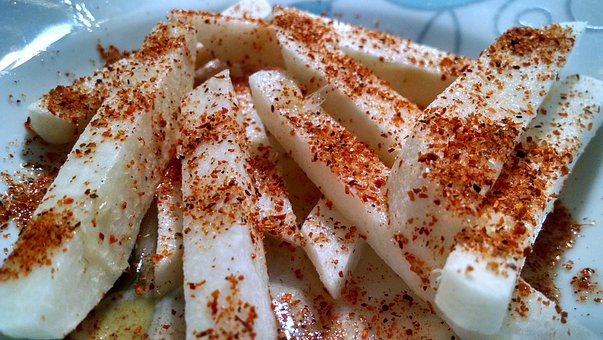
Jicama is one of the most overlooked in the vegetable isle. I’m going to tell you why it is fabulous!
Jicama is a root vegetable native to central and South America and has been used for thousands of years as a dietary element and a medicinally beneficial substance. The name “jicama” is also the name of the vine of this vegetable, although the tuberous root is the most commonly eaten part. Some other names for jicama include Mexican yam or Mexican turnip. In terms of a scientific name, this root vegetable is classified as Pachyrhizus erosus.
The root itself can grow up to 2 meters long and can weigh up to 20 kgs at the extreme. It requires between 6-9 months of frost-free growth time, so it is cultivated in warm weather, making Mexico and the surrounding areas of America ideal for its growth. Its cultivation began in Mexico but soon moved to the Philippines, and from there, it went to China and other parts of Southeast Asia. It is a popular element in these cuisines. The interior of the jicama is similar to a potato or a pear in terms of consistency and color. Like most root vegetables, it is high in starch. It is most commonly eaten raw, seasoned with various spices or fruit juices, as well as chili powder. It can also be cooked in soups and stir fry dishes, but some of its health benefits are slightly decreased in that way. Jicama can also be dried into slices like potato fries and used in dips. They are also good elements to add to various salads and side dishes. While the root is very beneficial and delicious, the rest of the vine vegetable is highly poisonous, including the seeds!
Health Benefits of Jicama
According to Organic Facts jicama provides many health benefits that include the following:
Improves Digestion
One of the most important elements of jicama is the high levels of dietary fiber that it contains. Dr. James M Lattimer, Department of Human Nutrition, Kansas State University, USA, stated in a report published in the Nutrients Journal that foods with high dietary fiber content help increase the bulk of stool, thereby helping it move through the digestive tract and treating conditions like constipation. Furthermore, jicama is a rich source of a soluble fiber called oligofructose inulin, which is a sweet, inert carbohydrate that does not metabolize into simple sugars. This means that for diabetics, jicama can be a great way to have some sweet food without worrying about blood sugar fluctuation.
Boosts Immune System
There is a very large amount of vitamin C found in jicama; 100 grams of jicama gives approximately 40% of our entire daily requirement for ascorbic acid. Vitamin C is an essential part of our immune system as it stimulates the white blood cells, which are the body’s first main line of defense against illness. Battling bacterial, viral, fungal or pathogenic diseases is done by adding vitamin C to your body. Also, the antioxidant potential of vitamin C means that it helps in fighting cancer by neutralizing the effects of free radicals connected with heart diseases and cancer. Free radicals are found in the body as a result of cellular metabolism.
Manages Blood Pressure
As a rich source of potassium, jicama is able to manage blood pressure, since it is a vasodilator and reduces the tension on blood vessels and arteries, thereby lowering stress on the cardiovascular system. Researchers from the University of Alabama conducted a study in 2010 in which it showed that potassium caused the blood pressure to decline, which eventually improved heart health and prevented a stroke. Potassium is also essential for maintaining fluid balance in opposition to sodium throughout the body, thereby keeping our body hydrated and functioning at a high level.
Improves Blood Circulation
The significant amounts of copper and iron found in jicama make it very good for maintaining the health of the circulatory system since these two minerals are important elements of red blood cells. Without these components, people suffer from anemia and also face a low functioning of the organs that require fresh, oxygenated blood to function properly.
Improves Brain Function
Vitamin B6 has been linked to increased brain function and cognitive abilities, and jicama has this vitamin in significant amounts. Furthermore, vitamin B6 is integral in breaking down proteins into usable amino acids. This maximizes the metabolic processes and efficiency of various organs.
Strengthens Bones
The minerals like manganese, magnesium, iron, and copper found in jicama mean that this root vegetable can be a major booster for our bone mineral density. These minerals are essential for building strong, new bones and healing any damage to existing bones. This is also the best way to prevent the onset of conditions like osteoporosis, which millions of people suffer from all over the world.
Weight Loss
Low-calorie foods are very important for those trying to lose weight, especially when those low-calorie foods are also packed with nutrients and dietary fiber to make you feel full. Jicama only has 35 calories per 100 grams and is filled with nutrients. Besides, it is high in both water and fiber, which keeps you satiated for long. It is also an excellent snack to reduce your appetite and curb cravings without gaining any weight or losing any nutritional benefits.
Moreover, insulin resistance, which is a major cause of obesity, can be controlled and managed with the consumption of jicama. A study conducted on mice by a team of doctors as recent as 2016, suggested that consuming jicama may increase insulin sensitivity and eventually decrease blood sugar levels, directly bringing down your body weight.
Word of Caution: As mentioned earlier, the root of jicama is edible, but the rest of the plant is highly toxic. Be careful not to eat the seed pods, leaves or vines. Other than that, jicama is a healthy choice that can bring you a number of benefits!
Happy Healthy Eating! Dana
https://www.organicfacts.net/health-benefits/vegetable/jicama.html









